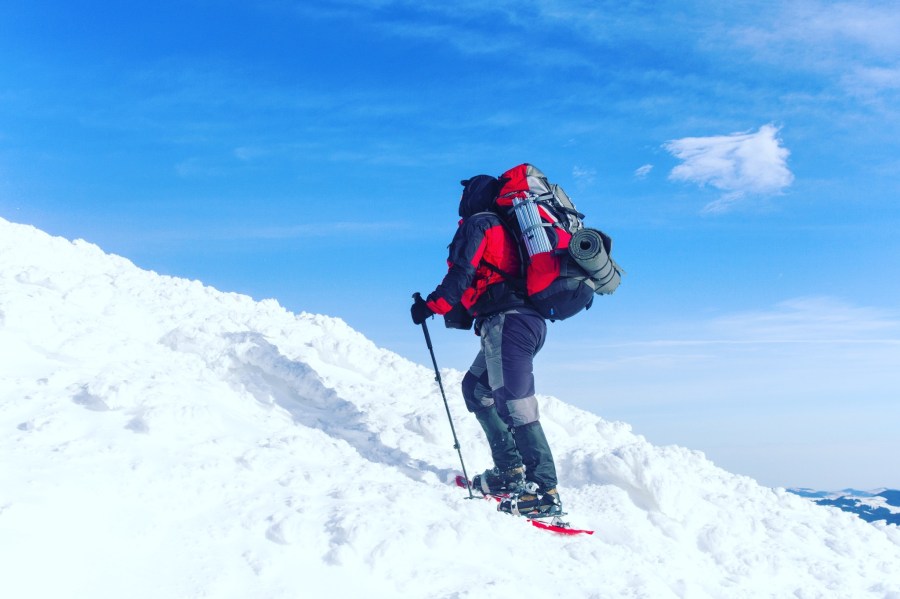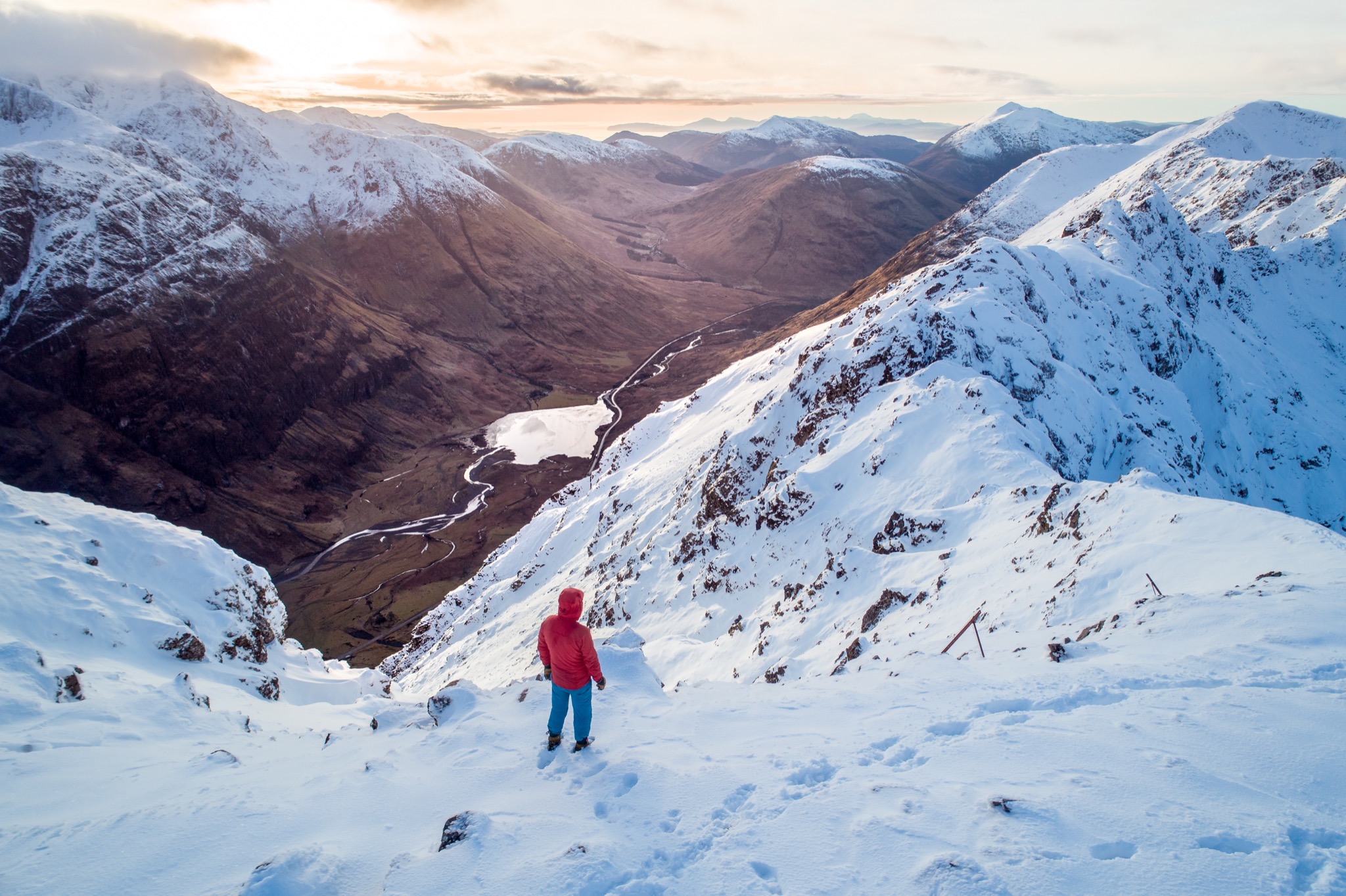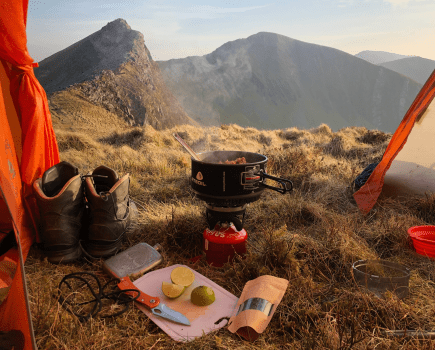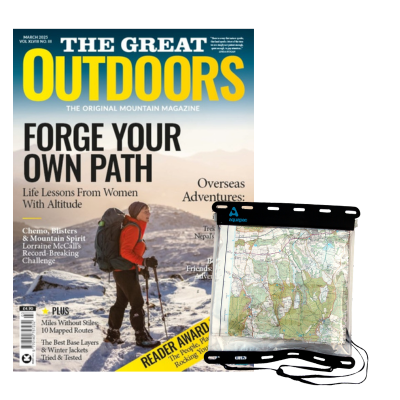This skills guide on staying warm in winter was first published in the January 2017 issue of The Great Outdoors.
Winter days can be the most rewarding, with snow-covered mountains taking on a whole new appeal. However, they can also produce the harshest conditions, with cold air temperatures combined with strong winds producing a chill factor well below zero. These conditions make staying warm in winter on the mountainside much harder.
Main image: Vitalii Nesterchuk/Shutterstock
So how do we get out to enjoy this environment and still stay comfortable? Here are a few ways to help stave off the cold, shared by Phil Sanderson, Instructor at Glenmore Lodge, Aviemore.
7 tips for staying warm in winter
1. Fuel the engine
We only stay warm when there’s fuel in the tank. Winter days should start with a good breakfast – a helping of complex carbs works well, and for me that usually means a big bowl of porride. You can then top up using a little-and-often approach during the day. I have supplies in my jacket pockets which are easy to reach and keep me sustained. A hot flask in my rucksack also maintains hydration levels and provides a much-needed energy boost.
2. Layer up
Dressing warm from the inside out is a good approach, starting with a good set of thermals (top and bottoms) which will help to move any moisture away from the skin and trap a warm layer of air. Next come layers of insulation – how many and how thick depends on my activity and the day’s conditions. Getting the balance right means I stay warm and don’t overheat. My outer layers are wind- and waterproof as the day’s weather dictates.
3. Travel steady
My winter days often see me on the move most of the time. Stops are dictated by the weather and are usually short. With my rucksack on the ground to get what I need, I always ask myself what else I need either now or soon – more food in a pocket? A change of gloves? To get my map and compass out? This approach means my stops are fewer and I will move more constantly and stay warmer.
4. Longer stop ready
If stopping for longer than a few minutes, I make sure I’m equipped to make this as comfortable as possible. My big ‘standing around’ jacket fits over everything, and is filled with synthetic insulation that will work in both the wet and dry cold. I usually sit down on my rucksack to help prevent heat escaping into the ground. Nylon group shelters also help because body heat is shared so you and your party stay warmer.
5. Extremities covered
These extra items need not add too much to your rucksack. In Scotland wet gloves are a regular occurrence on winter days. I always have more than I need in my pack: my walk-in pair, my climbing or summit pair and my later in the day ‘get me home’ pair. The last set is a pair of super-warm waterproof mitts to help towards the end of the day. A spare balaclava in my pack can also help. This extra layer not only insulates my head further but also prevents heat loss and cold air around my neck.
6. Be bothered
As our bodies grow colder, so does our motivation to do something about it. If your hands are cold it’s a sure sign that your overall body temperature has dropped. The hassle of stopping to get that extra layer out of your pack may feel like a big task – but change into dry gloves while you’re at it and get something to eat at the same time. Even if this is in the last few minutes of the day, you will feel the benefit not only today but the next. Your body will be recovering from a comfortable day rather than finishing super-cold and tired.
7. Be realistic
Scottish winter days can have the most demanding of conditions. Combinations of cold air, strong winds and deep snow underfoot can make what would be an ordinary hill day in summer into something epic. Long days like this can see people battling to stay warm in the latter part of the day – with energy expended just looking for the car or a bothy. Proper planning can help with this. Can you do a day with the wind on your back? With deep snow conditions, can you link together ridge lines where the ground has been scoured by the wind? Could you access more remote peaks from a bothy, leading to a shorter day?
Check out the Glenmore Lodge website at glenmorelodge.org.uk for details of their winter skills courses and to learn more about staying warm in winter or call 01479 861 256.









